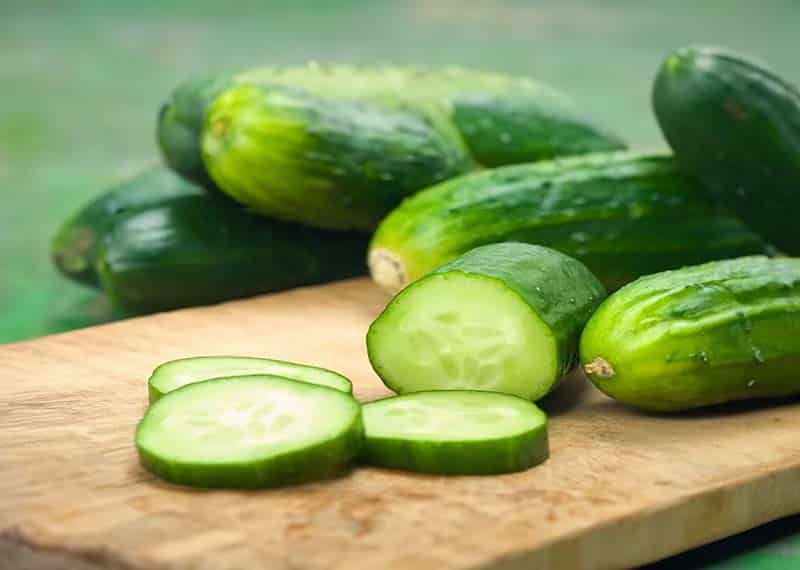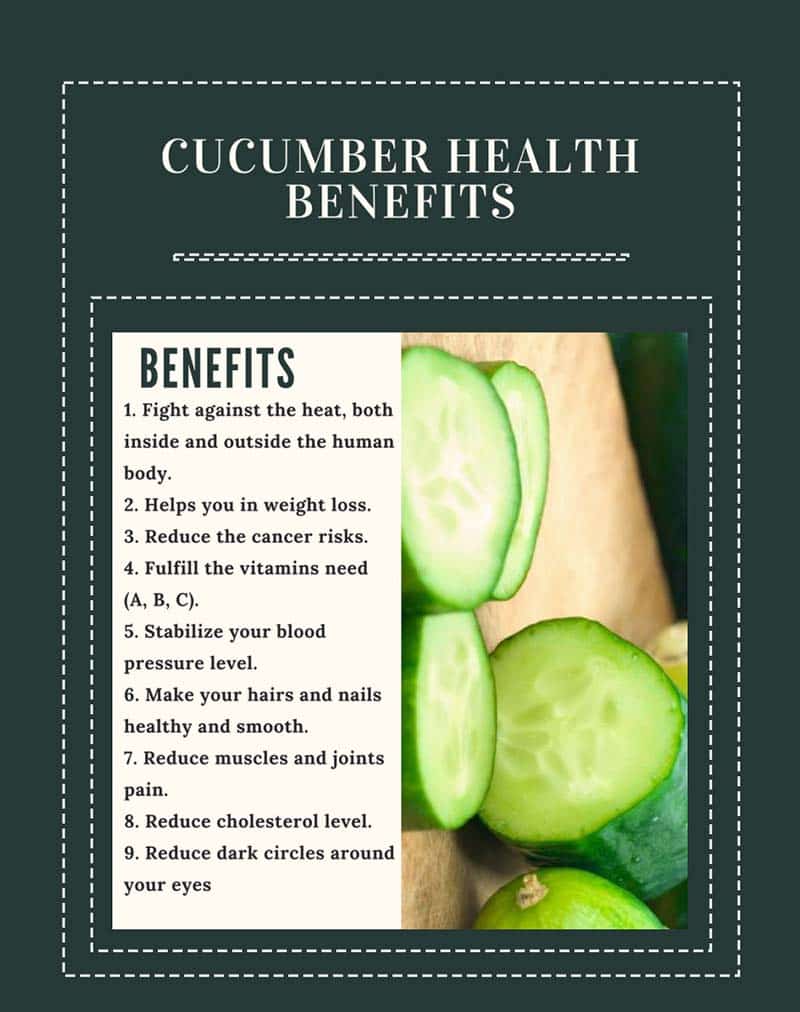Did you know that cucumbers, already famous for being super healthy, can also help you lose weight? Yes, you read that right! This snack, which doesn’t have many calories, is perfect for adding a fresh touch to your meals. You can toss them into salads, sandwiches, or even drinks to make them both yummy and good for losing weight.
Let’s dive into the world of cucumbers and find out why they’re an awesome addition to your everyday diet, especially if you’re trying to slim down. Get ready to give your meals a fun, healthy twist with cucumbers!
Does Eating Cucumbers Aid In Weight Loss?
Cucumbers are exceptionally low in calories yet high in water content and soluble fiber. This combination is a win-win for weight loss.
The water content boosts hydration, which is crucial for maintaining a healthy metabolism and aiding overall bodily functions. Meanwhile, the soluble fiber in cucumbers helps you feel full longer, reducing the likelihood of overeating. Plus, fiber aids in digestion, ensuring your body efficiently processes what you eat. It’s not just about eating less; it’s about making smart, nutritious choices, and cucumbers fit that bill perfectly. An examination of 13 studies involving 3,628 people showed that eating foods high in water and low in calories was linked to a noticeable drop in body weight.

The Health Benefits Of Cucumbers
Cucumbers are not just a refreshing addition to your salad; they’re a powerhouse of health benefits. Here are the wonders this humble vegetable brings to the table.
Cancer Prevention: Cucumbers are rich in lignans like pinoresinol and lariciresinol, which have been linked to a lower risk of several cancers, including breast, uterine, ovarian, and prostate cancers. Additionally, a phytonutrient in cucumbers, cucurbitacin, exhibits anti-cancer properties.
Blood Sugar Regulation: Thanks to their high fiber and antioxidant content, cucumbers are great for keeping blood sugar levels in check, thereby reducing diabetes complications. Their low glycemic index means they have a minimal impact on your blood sugar.
Boosting Hair and Skin Health: Cucumbers’ high water content is a boon for your scalp, aiding in hair follicle hydration, reducing hair loss, and adding shine. They also contain essential minerals like silicon, salt, sulfur, and potassium, promoting healthy hair growth.
Detoxification: The cucurbitacin in cucumbers supports liver and digestive health, playing a key role in cleansing the body of toxins.
Bone Strength: Cucumbers contain calcium and Vitamin K, both essential for bone strength and health. Vitamin K enhances calcium absorption and bone formation while also being a key player in preventing osteoporosis.
Reducing Eye Puffiness: The combination of ascorbic and caffeic acid in cucumbers helps reduce water retention, thus diminishing puffiness around the eyes.
Easing Constipation: With their high water (95%) and fiber content, cucumbers effectively prevent constipation, ensuring smooth bowel movements.
Benefits for the Nervous System: The B vitamins in cucumbers help soothe and relax the nervous system, reducing stress and anxiety.
Oral Health: Cucumbers contain phytochemicals that combat harmful microorganisms in the mouth, helping to freshen breath and promote overall oral health.

How To Lose Weight With Cucumbers For A Slim Figure
Starting a diet focused on cucumbers might be a good trick for getting thinner. This diet takes advantage of the fact that cucumbers have few calories but a lot of water and a good amount of fiber.
- Use As a Go-To Snack: Whenever hunger strikes, reach for a cucumber. This simple habit can significantly cut down on unnecessary calorie intake.
- Creative Cucumber Meals: Get inventive with cucumbers – think refreshing cucumber smoothies or crunchy cucumber salads. These meals are not only delicious but also incredibly low in calories.
- Add Healthy Fats: Incorporate a bit of healthy fat, like olive or flaxseed oil. These good fats are essential for overall health and help in nutrient absorption.
- Combine with Proteins: Balance your cucumber dishes with protein-rich foods. Options like boiled eggs, lean meats, tuna, cottage cheese, and nuts will keep you fuller for longer and aid in muscle building.
- Include Carbohydrates: Don’t shy away from carbs completely. Add wholesome carbs like toast, brown rice, or potatoes in moderation to maintain energy levels.
- Mix in Other Veggies: Enhance your meals with other low-calorie vegetables like tomatoes, spinach, and celery. This not only adds variety but also ensures a broader range of nutrients.

Remember, while cucumbers are a fantastic tool for weight loss, a balanced approach combining various food groups is crucial for a healthy, sustainable diet. This cucumber-centric diet strategy could be your pathway to a slimmer, healthier body.
Suggestions For A Cucumber-Based Weight Loss Diet
This seven-day diet plan offers a diverse and nutritious approach to weight loss, with cucumbers playing a starring role for their hydrating and low-calorie benefits. Remember to drink plenty of water and tailor portion sizes to your personal nutritional needs. Here’s your cucumber-centric diet plan:
Day 1
- Breakfast: Whole-grain bread with cheese and cucumber slices.
- Snack: Chopped cucumbers and a boiled egg.
- Lunch: Grilled salmon with lemon juice and a cucumber salad.
- Snack: An orange.
- Dinner: Cucumber and snap pea salad.
Day 2
- Breakfast: Cucumber and pineapple smoothie.
- Snack: Cucumbers with hummus.
- Lunch: Roast pork and pickled cucumber sandwich.
- Snack: Cucumbers with tuna.
- Dinner: Salad with broccoli, green beans, tomatoes, cucumbers, and olive oil.
Day 3
- Breakfast: Spinach, cucumber, and apple smoothie.
- Snack: Chopped cucumbers with flax seeds.
- Lunch: Seared salmon with Israeli couscous and cucumber salad.
- Snack: A big green apple.
- Dinner: Coriander roasted chicken with chickpea and avocado salad.
Day 4
- Breakfast: Whole-grain bread with cheese and cucumber.
- Snack: Three cucumbers.
- Lunch: Brown rice with chicken and cucumbers.
- Snack: A banana.
- Dinner: Spicy hoisin skirt steak with cucumber salad.
Day 5
- Breakfast: Homemade granola with cherries, blueberries, and Greek yogurt.
- Snack: Two cucumbers.
- Lunch: Vegetable salad with tomatoes, cucumbers, olives, and feta cheese.
- Snack: Honeydew, cucumber, and mint drink.
- Dinner: Cucumber and charred onion salad.
Day 6
- Breakfast: Spinach, cucumber, and apple smoothie.
- Snack: Two cucumbers.
- Lunch: Flatbread with fava beans, cucumbers, and burrata.
- Snack: Cucumber raita with black mustard and cilantro.
- Dinner: Savory peach and cucumber salad.
Day 7
- Breakfast: Homemade granola with honey, raspberries, and Greek yogurt.
- Snack: Two cucumbers.
- Lunch: Crisp chicken salad with cucumbers and carrots.
- Snack: Cucumbers with hummus.
- Dinner: Vegetable salad with broccoli, green beans, tomatoes, cucumbers, and olive oil.

This cucumber-based diet plan is not only about weight loss but also about enjoying a variety of flavors and nutrients while maintaining a focus on hydration and low-calorie intake.
Things To Note When Losing Weight With Cucumbers
When you include cucumbers in your diet to lose weight, it’s important to understand what they do and what they don’t do. Cucumbers are great for weight loss because they don’t have many calories and are full of water and fiber. These things make them a good choice for a weight loss diet. You can eat cucumbers in different ways, like in tasty salads, cool smoothies, or just as a refreshing snack.
Best Times to Eat Them: For the best results, try eating cucumbers in the morning or as part of your afternoon snack. This can help you get the most out of their weight loss benefits.
Short-term Use: Remember, a diet that mostly includes cucumbers should be for a short time, not forever. Cucumbers are healthy, but they don’t have all the nutrients your body needs for a long time.
Eating a Balanced Diet: To lose weight well and keep it off, you should eat cucumbers as part of a balanced diet. This means eating other kinds of food too, like proteins, healthy fats, and different fruits and vegetables.
Exercise: Besides changing what you eat, regular exercise is important for losing weight. Exercise helps burn calories, speeds up your metabolism, and improves your overall health.
Conclusion
To sum up, is cucumber good for weight loss?. They have few calories and help keep you hydrated, making them a great option for those trying to get thinner. This blog aimed to show how useful cucumbers can be for weight loss.
We’re eager to hear if you’ve tried cucumbers in your diet. Share your stories in the comments, and check out more helpful blogs from Bodyfitnt for health and fitness advice. Keep working towards your health goals, and remember, sometimes simple foods are the most effective.

Born on July 26, 1960, Professor Tim Olds is a leading authority in the field of health sciences, focusing on exercise science, nutrition, and well-being. As the Bradley Distinguished Professor at the University of South Australia, his research offers pivotal insights into the effects of physical activity, diet, and lifestyle on health outcomes for both men and women.
Having completed two PhDs, one in French Studies and the other in exercise science, Professor Olds has uniquely blended his academic background to explore the multifaceted connections between human behavior, physical fitness, and nutrition. His work in mathematical modeling of cycling performance, anthropometry, and trends in fitness and fatness has informed strategies for weight management and healthy living.
Professor Olds served as the Project Director for the Australian National Nutrition and Physical Activity Survey, examining how diet and physical activity influence health on a national scale. His work on the ADAPT Project, focusing on 3D anthropometry, further showcased his innovative approach to understanding human physicality.
With numerous influential publications, Professor Olds has contributed substantially to the public’s understanding of diet, weight loss, and personalized fitness strategies. His findings have been instrumental in shaping health policies and behavioral change programs aimed at improving individual and community wellness.
From exploring women’s health concerns to understanding men’s fitness needs, Professor Olds’s research transcends gender barriers and offers a comprehensive view of the role of exercise and nutrition in enhancing life quality. His enduring commitment to health education and advocacy continues to inspire people to make informed decisions for a balanced and healthy life.
Professor Tim Olds’s trailblazing work stands as a vital resource for anyone interested in embracing a healthier lifestyle, understanding the science of physical activity, or pursuing effective strategies for diet and weight loss. His academic excellence and practical wisdom make him an essential voice in the ongoing conversation about health and well-being in the modern world.
PUBLISHED ARTICLES
- Olds, T. (2012). Evidence for a Sugars-to-Mental Health Pipeline. Atherosclerosis Supplements, 13(4), 29-30.
- Olds, T., Maher, C., & Zumin, S. (2011). The evolution of screen time: What’s next? Journal of Physical Activity and Health, 8(2), 236-244.
- Olds, T., Ferrar, K., Schranz, N., & Maher, C. (2013). Obese adolescents are less active than their normal‐weight peers, but wherein lies the difference? Journal of Adolescent Health, 53(6), 768-774.
- Olds, T., Maher, C., & Matricciani, L. (2010). Sleep duration or bedtime? Exploring the relationship between sleep habits and weight status and activity patterns. Sleep, 33(12), 1576-1581.
- Olds, T., Ridley, K., & Dollman, J. (2006). Screenieboppers and extreme screenies: The place of screen time in the time budgets of 10–13 year‐old Australian children. Australian and New Zealand Journal of Public Health, 30(2), 137-142.
These published articles reflect Professor Tim Olds’ contributions to various aspects of physical activity, sedentary behavior, and health-related research. They provide insights into the intricate relationship between lifestyle choices and health outcomes

